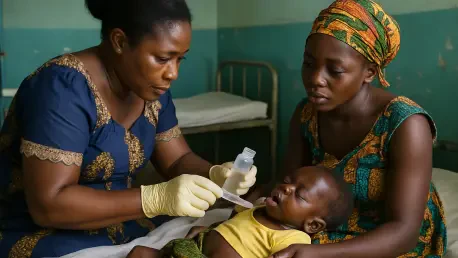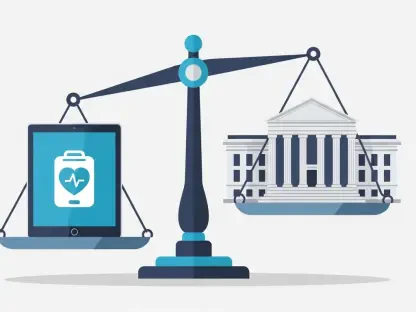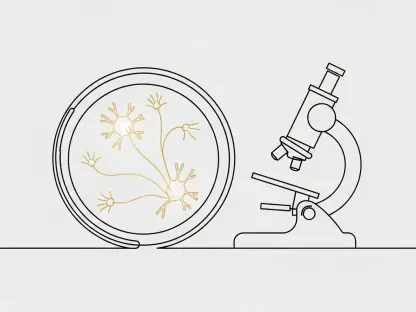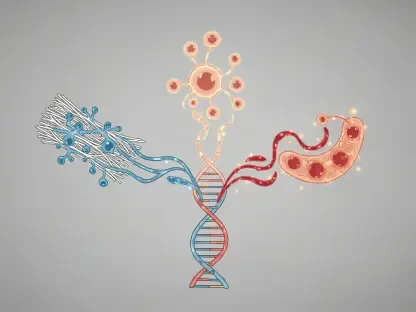In the heart of West Africa, Ghana faces a relentless battle against malaria, a disease that continues to claim the lives of countless infants each year due to their vulnerable immune systems and the historical absence of treatments designed specifically for them, leaving families desperate for solutions. A beacon of hope has emerged with the recent approval of Coartem Baby, a groundbreaking drug tailored for newborns, promising to transform the landscape of infant care in a region where malaria remains a leading cause of death. Yet, this potential lifeline is overshadowed by a severe financial crisis, as significant funding cuts from the United States threaten not only the rollout of this innovative treatment but also the broader efforts to control and prevent the disease across the nation. The juxtaposition of scientific advancement against fiscal constraints paints a complex picture of progress and peril, raising critical questions about whether Ghana can sustain its fight against malaria. This article delves into the human toll of the disease, the significance of the new drug, the challenges posed by diminished international support, and the urgent search for solutions to protect the most vulnerable.
The Devastating Impact on Families
The human cost of malaria in Ghana is staggering, particularly for families with young children who bear the brunt of this deadly disease. Mothers like Nadima Umar Uthman and Audrey Baah have shared harrowing experiences of watching their babies suffer through high fevers, convulsions, and other life-threatening symptoms, often feeling powerless without access to appropriate medical interventions. Their stories are not isolated but reflect a broader tragedy unfolding across Africa, where malaria accounted for 94% of global cases and claimed over 600,000 lives in 2023, with children making up the majority of fatalities. The emotional and physical toll on parents, coupled with the strain on already overburdened healthcare systems, underscores the urgent need for effective solutions tailored to the youngest and most fragile patients.
Beyond personal narratives, the statistics paint a grim reality of systemic challenges in combating malaria among infants. The lack of age-specific treatments has historically forced healthcare providers to adapt medications intended for older children or adults, often leading to dangerous dosing inaccuracies that can harm rather than heal. This gap in care exacerbates the vulnerability of newborns whose underdeveloped immune systems struggle to fight the parasite. In communities like Pokuase near Accra, the fear of losing a child to malaria is a constant shadow, highlighting the critical importance of interventions that address these unique medical needs. The widespread impact on families serves as a poignant reminder of why advancements in treatment are not just necessary but long overdue.
A Breakthrough in Infant Care
Ghana’s recent approval of Coartem Baby marks a historic turning point in the fight against malaria, offering a targeted solution for newborns who have long been overlooked in treatment development. Developed through a collaboration between Novartis and the Swiss nonprofit Medicines for Malaria Venture, this cherry-flavored medication is designed to dissolve in breast milk, making it both accessible and safe for the tiniest patients. Clinical trials spanning eight African countries over nearly a decade have confirmed its efficacy, providing a reliable option where none previously existed. Dr. Hilda Mantebea Boye, a pediatrician at Korle Bu Teaching Hospital, has expressed profound optimism about its potential to close a critical treatment gap, emphasizing how it addresses the specific physiological needs of infants.
The significance of Coartem Baby extends beyond its formulation to the hope it instills in healthcare providers and families alike. Unlike earlier practices where drugs for older age groups were repurposed with risky guesswork, this treatment offers precise dosing tailored to the delicate systems of newborns, minimizing the dangers of over- or under-medication. The anticipation surrounding its rollout, potentially by the end of the current year, has sparked a renewed sense of possibility among medical professionals who have long grappled with inadequate tools. For communities ravaged by malaria, this drug represents more than a medical advancement; it is a symbol of progress and a chance to save countless young lives from a preventable tragedy.
Challenges in Implementation
While the approval of Coartem Baby brings a wave of optimism, the path to its effective implementation in Ghana is fraught with obstacles, primarily due to logistical and financial barriers. The healthcare infrastructure in many regions struggles with limited resources, making the distribution of a new drug to remote and underserved areas a daunting task. Hospitals and clinics often lack the necessary training and supplies to integrate a novel treatment into their routines, which could delay its impact even in urban centers. The urgency to see tangible results is palpable among healthcare workers, who are eager to witness a reduction in infant mortality but remain cautious about the practical hurdles that lie ahead.
Compounding these logistical challenges is the looming threat of insufficient funding to support the drug’s rollout on a national scale. The initiative requires not only the procurement of Coartem Baby but also extensive public education campaigns to ensure families and local health providers understand its use and importance. Without adequate financial backing, the risk of uneven access grows, potentially leaving rural communities excluded from this lifesaving innovation. The promise of reduced infant deaths hangs in a delicate balance, dependent on overcoming these systemic issues to ensure that every child, regardless of location, benefits from this medical breakthrough. The road ahead demands strategic planning and robust support to turn potential into reality.
The Funding Crisis Threatening Progress
A significant shadow over Ghana’s malaria control efforts is cast by drastic funding cuts from the United States, a key supporter of global health initiatives in Africa for decades. Through agencies like USAID and the President’s Malaria Initiative, American aid has historically funded critical interventions such as indoor residual spraying, mosquito net distribution, and public awareness campaigns. However, under the Trump administration, these resources have dwindled, leaving a reported $10 million shortfall in Ghana alone, according to Dr. Paul Boateng of the National Malaria Elimination Program. This financial gap disrupts not only immediate healthcare delivery but also the foundational efforts needed to prevent outbreaks.
The ripple effects of these cuts are felt across every layer of malaria management, from community-level prevention to hospital care. Essential programs that once provided widespread protection are now scaled back, increasing the risk of resurgence in areas previously under control. The inability to maintain consistent interventions undermines years of progress, placing additional strain on an already fragile system. For families relying on these initiatives to safeguard their children, the reduction in support translates to heightened vulnerability and fear. The funding crisis is not merely a budgetary issue but a direct threat to the lives of countless infants who depend on sustained international commitment to survive the scourge of malaria.
Halting Innovation at a Critical Time
Beyond immediate care, the funding shortfall has brought innovative research in Ghana to a grinding halt, stalling projects that could redefine malaria prevention. At the University of Ghana, Dr. Fred Aboagye-Antwi has been exploring gene drive technology to genetically modify Anopheles mosquitoes, aiming to reduce their capacity to transmit the parasite. His work, part of the global Target Malaria consortium, also investigates natural prevention methods like plant juices to weaken mosquitoes, offering a potentially low-cost solution. However, with foreign grants frozen, these promising studies are now described as “on ice,” unable to move forward without financial support.
Similarly, at the Ghana Atomic Energy Commission, Professor Michael Osae’s research into the sterile insect technique, which uses radiation to render male mosquitoes infertile and curb population growth, faces severe setbacks. Previously supported by USAID, this initiative has slowed to a near standstill, with even basic field data collection becoming unfeasible. The loss of funding for such cutting-edge approaches represents a missed opportunity to tackle malaria at its source, beyond just treatment. These stalled projects highlight a broader concern: without investment in research, the fight against an evolving parasite risks falling behind, leaving future generations exposed to an increasingly resistant disease. The scientific community’s frustration is palpable as potential breakthroughs remain out of reach.
Global Implications of Reduced Support
The repercussions of diminished US funding extend far beyond Ghana’s borders, threatening global health security and the collective fight against malaria. Professor Jane Carlton of Johns Hopkins University has warned that these cuts could delay the introduction of vital vaccines like RTS,S and R21/Matrix-M, recently approved by the World Health Organization, which are crucial for long-term control of the disease. The reduction in American leadership also weakens international collaboration, a cornerstone of past successes in reducing malaria’s global burden. This retreat risks not only local setbacks but also a broader erosion of progress achieved through decades of joint efforts.
Moreover, the funding crisis amplifies the challenge of addressing an adapting malaria parasite, marked by growing drug resistance and silent transmission by asymptomatic carriers. Without sustained resources, the capacity to monitor and respond to these evolving threats diminishes, potentially leading to a resurgence of cases across Africa and beyond. The interconnected nature of global health means that a failure to invest in one region can have cascading effects, undermining stability elsewhere. The urgency to maintain a unified front against malaria is clear, as the consequences of inaction could reverse hard-won gains and jeopardize the safety of vulnerable populations worldwide. Ghana’s struggle serves as a stark warning of the stakes involved.
Exploring Alternative Pathways
In response to the funding crisis, Ghanaian experts are actively seeking alternative solutions to sustain their malaria control efforts, though the path forward remains uncertain. Dr. Hilda Mantebea Boye advocates for renewed negotiations with the US government to honor previously agreed-upon commitments, hoping to restore at least partial support for ongoing projects. This diplomatic approach aims to salvage critical interventions and research, but skepticism lingers about the likelihood of success given the current political climate. The effort reflects a determination to preserve international partnerships despite daunting challenges, with a focus on dialogue as a potential bridge to recovery.
Meanwhile, Professor Michael Osae proposes engaging the private sector through corporate social responsibility initiatives, suggesting that businesses could play a pivotal role in filling the financial void left by foreign aid cuts. This idea, while innovative, faces hurdles in terms of scale and reliability, as private contributions often lack the consistency and magnitude of governmental funding. The search for diverse revenue streams underscores a broader push for self-reliance, yet the feasibility of such alternatives remains under scrutiny. As Ghana navigates this complex landscape, the balance between immediate needs and long-term strategies hangs in a precarious state, with experts and policymakers grappling to secure resources for both treatment and prevention.
Navigating a Future of Uncertainty
Reflecting on Ghana’s journey, the approval of Coartem Baby stood as a monumental achievement, offering a lifeline to infants who faced dire odds against malaria. The personal struggles of mothers, the dedication of healthcare providers, and the ingenuity of researchers painted a vivid picture of a nation striving for better outcomes. Yet, the severe funding cuts from the US cast a long shadow over these efforts, halting essential programs and innovative studies that were poised to reshape the battle against the disease. The warnings from global health experts about the risks of delayed vaccines and diminished leadership echoed as a somber reminder of what is at stake.
Looking ahead, the focus must shift to actionable steps that can bridge the financial gap and safeguard past gains. Strengthening partnerships with international donors, beyond traditional sources, could provide a buffer while domestic resources are mobilized. Encouraging regional collaboration within Africa to pool expertise and funding might offer a sustainable model for resilience. Additionally, prioritizing cost-effective prevention alongside treatment ensures a comprehensive approach to an evolving threat. Ghana’s experience highlights the fragility of progress in global health, urging a renewed commitment to protect the most vulnerable through innovative financing and unwavering resolve.









